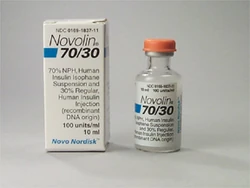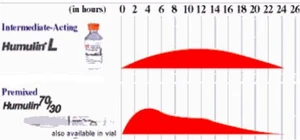No edit summary |
No edit summary |
||
| Line 51: | Line 51: | ||
As of January 1, 2010, Novo has discontinued offering Novolin 70/30 in cartridges for refillable insulin pens<ref>{{cite web|url=http://www.novonordiskcare.com/novolog-novolin-pens/ |title=Novo discontinuation notice for pens|publisher=Novo Nordisk}}</ref><ref>{{cite web|url=http://www.fda.gov/downloads/Drugs/DrugSafety/DrugShortages/UCM177159.pdf |title=Novolin 70/30 cartridge Discontinuation Notice|publisher= US Food and Drug Administration}}</ref>. |
As of January 1, 2010, Novo has discontinued offering Novolin 70/30 in cartridges for refillable insulin pens<ref>{{cite web|url=http://www.novonordiskcare.com/novolog-novolin-pens/ |title=Novo discontinuation notice for pens|publisher=Novo Nordisk}}</ref><ref>{{cite web|url=http://www.fda.gov/downloads/Drugs/DrugSafety/DrugShortages/UCM177159.pdf |title=Novolin 70/30 cartridge Discontinuation Notice|publisher= US Food and Drug Administration}}</ref>. |
||
| + | |||
| ⚫ | |||
| ⚫ | |||
| ⚫ | Let's look at the differences in the two insulins. Lente is comprised of 70 % [[:Category:Long-acting|long-acting]] [[Ultralente]] insulin and 30% [[:Category:Short-acting|short-acting]] [[Semilente]] insulin. So proportions of a long-acting and short-acting insulin are being combined to produce a [[:Category:Intermediate-acting|intermediate-acting]] insulin. Both Ultralente and Semilente insulin are [[suspension|suspended]] by adding [[:Category:Zinc|zinc]] and the size of their respective insulin crystals. The largest insulin crystals are those of Ultralente, while Semilente contains the smallest, or microcrystals. Simply put, you're combining a long insulin and a short insulin to make an intermediate-acting one. |
||
| + | |||
| ⚫ | 70/30 insulin starts with 70% [[NPH]]/isophane insulin, an [[:Category:Intermediate-acting|intermediate-acting]] insulin which is suspended by [[Protamine|protamine]]. To that, 30% [[R]]/neutral/normal insulin, which is [[:Category:Short-acting|short-acting]] and [[Soluble insulin|soluble]], meaning there is no suspension; nothing is added to this insulin to delay its action. In this case, you are taking an intermediate-acting insulin with a suspension and adding to it a short-acting one with no suspension to create an intermediate-acting insulin. |
||
| + | |||
| ⚫ | So we have an insulin ([[:Category:Lente|Lente]]), made up of a long-acting and short-acting insulin, both with [[:Category:Zinc|zinc]] suspensions, and a [[:Category:Mixed|mixed]] insulin (70/30), made from an intermediate-acting [[:Category:Isophane|protamine]] suspended insulin and a short-acting one without any suspension. Because of these differences, the insulin action profile for these two insulins is going to be quite different, even though both insulins are classed as intermediate-acting. |
||
[[Mixed insulins]] cover a wide range as they can be animal origin, r-DNA/GE/GM origin or analog insulins. The non-analog mixed insulins are made up of [[:Category:Intermediate-acting|intermediate-acting]] [[NPH]]/isophane insulin and [[:Category:Short-acting|short-acting]] [[R]]/neutral. normal insulin. The analog mixes are made from [[:Category:Intermediate-acting|intermediate-acting]] protamine-suspended analog insulin (suspended similar to NPH/isophane insulin) and [[:Category:Fast-acting|fast-acting]] analog insulin. They can also vary in the fraction (amount or percent) of the two types (R/neutral and NPH/isophane) of insulin used to make a non-analog mix, and in the percentage of fast/rapid-acting analog insulin and slower-acting protamine suspended analog insulin. |
[[Mixed insulins]] cover a wide range as they can be animal origin, r-DNA/GE/GM origin or analog insulins. The non-analog mixed insulins are made up of [[:Category:Intermediate-acting|intermediate-acting]] [[NPH]]/isophane insulin and [[:Category:Short-acting|short-acting]] [[R]]/neutral. normal insulin. The analog mixes are made from [[:Category:Intermediate-acting|intermediate-acting]] protamine-suspended analog insulin (suspended similar to NPH/isophane insulin) and [[:Category:Fast-acting|fast-acting]] analog insulin. They can also vary in the fraction (amount or percent) of the two types (R/neutral and NPH/isophane) of insulin used to make a non-analog mix, and in the percentage of fast/rapid-acting analog insulin and slower-acting protamine suspended analog insulin. |
||
| Line 58: | Line 66: | ||
The most common mixes are 70/30 (30/70) (non analog) or 75/25 (25/75) (analog). There are no currently-marketed mixes which combine insulins of different origins. Eli Lilly's form of beef/pork [[Iletin]] and Novo Nordisk's Lentard were discontinued some time ago. Here are the most common ones that could cause confusion: |
The most common mixes are 70/30 (30/70) (non analog) or 75/25 (25/75) (analog). There are no currently-marketed mixes which combine insulins of different origins. Eli Lilly's form of beef/pork [[Iletin]] and Novo Nordisk's Lentard were discontinued some time ago. Here are the most common ones that could cause confusion: |
||
| ⚫ | |||
| − | |||
| ⚫ | |||
| − | {| align="center" width="500" border="1" bgcolor="powderblue"| |
||
| ⚫ | |||
|- |
|- |
||
! bgcolor="lightcyan" width="200" |[[Image:Intermediate_acting.jpg|200px]] |
! bgcolor="lightcyan" width="200" |[[Image:Intermediate_acting.jpg|200px]] |
||
! bgcolor="#cae1ff" colspan="2" |All [[Intermediate-acting]] |
! bgcolor="#cae1ff" colspan="2" |All [[Intermediate-acting]] |
||
| − | | |
+ | |- |
| ⚫ | |||
| ⚫ | |||
! colspan="1" bgcolor="aliceblue"| Expressed As |
! colspan="1" bgcolor="aliceblue"| Expressed As |
||
!colspan="1" bgcolor="aliceblue"|Expressed As |
!colspan="1" bgcolor="aliceblue"|Expressed As |
||
| ⚫ | |||
|- |
|- |
||
| ⚫ | |||
| ⚫ | |||
! colspan="1" bgcolor="ivory"|10/90 |
! colspan="1" bgcolor="ivory"|10/90 |
||
| ⚫ | |||
| ⚫ | |||
|- |
|- |
||
| ⚫ | |||
| ⚫ | |||
! colspan="1" bgcolor="ivory"|20% [[R|R/Neutral Insulin]]<br />80% [[NPH|NPH/Isophane Insulin]] |
! colspan="1" bgcolor="ivory"|20% [[R|R/Neutral Insulin]]<br />80% [[NPH|NPH/Isophane Insulin]] |
||
| ⚫ | |||
| ⚫ | |||
|- |
|- |
||
| ⚫ | |||
| ⚫ | |||
! colspan="1" bgcolor="ivory"|30/70 |
! colspan="1" bgcolor="ivory"|30/70 |
||
| ⚫ | |||
| ⚫ | |||
|- |
|- |
||
| ⚫ | |||
| ⚫ | |||
! colspan="1" bgcolor="ivory"|40/60 |
! colspan="1" bgcolor="ivory"|40/60 |
||
| ⚫ | |||
| ⚫ | |||
|- |
|- |
||
| ⚫ | |||
| ⚫ | |||
! colspan="1" bgcolor="ivory"|50/50 |
! colspan="1" bgcolor="ivory"|50/50 |
||
| ⚫ | |||
| ⚫ | |||
|} |
|} |
||
| − | |||
| ⚫ | |||
| ⚫ | |||
| ⚫ | Let's look at the differences in the two insulins. Lente is comprised of 70 % [[:Category:Long-acting|long-acting]] [[Ultralente]] insulin and 30% [[:Category:Short-acting|short-acting]] [[Semilente]] insulin. So proportions of a long-acting and short-acting insulin are being combined to produce a [[:Category:Intermediate-acting|intermediate-acting]] insulin. Both Ultralente and Semilente insulin are [[suspension|suspended]] by adding [[:Category:Zinc|zinc]] and the size of their respective insulin crystals. The largest insulin crystals are those of Ultralente, while Semilente contains the smallest, or microcrystals. Simply put, you're combining a long insulin and a short insulin to make an intermediate-acting one. |
||
| − | |||
| ⚫ | 70/30 insulin starts with 70% [[NPH]]/isophane insulin, an [[:Category:Intermediate-acting|intermediate-acting]] insulin which is suspended by [[Protamine|protamine]]. To that, 30% [[R]]/neutral/normal insulin, which is [[:Category:Short-acting|short-acting]] and [[Soluble insulin|soluble]], meaning there is no suspension; nothing is added to this insulin to delay its action. In this case, you are taking an intermediate-acting insulin with a suspension and adding to it a short-acting one with no suspension to create an intermediate-acting insulin. |
||
| − | |||
| ⚫ | So we have an insulin ([[:Category:Lente|Lente]]), made up of a long-acting and short-acting insulin, both with [[:Category:Zinc|zinc]] suspensions, and a [[:Category:Mixed|mixed]] insulin (70/30), made from an intermediate-acting [[:Category:Isophane|protamine]] suspended insulin and a short-acting one without any suspension. Because of these differences, the insulin action profile for these two insulins is going to be quite different, even though both insulins are classed as intermediate-acting. |
||
| − | |||
==References== |
==References== |
||
Revision as of 23:12, 29 September 2010
| Novolin 70/30 | |
| R/Neutral/NPH/Isophane Mix by Novo Nordisk | |
| intermediate-acting | r-DNA/GE/GM |
| U100 | isophane |
| Line | Novolin |
| Also known as | Actraphane 30/70, Mixtard 30, Novolin 30R, Penmix 30[1], ReliOn/Novolin 70/30 |
| Similar to | |
| Action in dogs |
|
| Use and Handling | |
|---|---|
| Type | cloudy |
| Shelf Life | 24 months |
| When opened | 28 days room temp. |
| In pen | 28 days room temp. |
| Notes |
|

Novolin Mixed 70/30 insulin-30% R/Neutral and 70% NPH/isophane.
This is the Novo Nordisk brand name for one of the mixed 30% R/neutral, 70% NPH/isophane crystal insulin it sells in North America; the other is ReliOn/Novolin 70/30
The same insulin made by the same company is called Mixtard 30[2][3] and Actraphane 30/70[4][5] once you cross the Atlantic.
Other comparable insulins made by other companies are: Humulin M3[6][7][8], Humulin 70/30[9], Umuline Profil 30, Huminsulin Profil III, Humulina 30/70, Humuline 30/70, Insuman Comb 30 and Winthrop Comb 30.
As of January 1, 2010, Novo has discontinued offering Novolin 70/30 in cartridges for refillable insulin pens[10][11].
Why Lente doesn't equal 70/30

Direct comparison of insulin activity profiles for Lente and 70/30 insulins. The early strong action from the non-suspended R/neutral/normal insulin is seen at the "bump" from hours 0-6.
Let's look at the differences in the two insulins. Lente is comprised of 70 % long-acting Ultralente insulin and 30% short-acting Semilente insulin. So proportions of a long-acting and short-acting insulin are being combined to produce a intermediate-acting insulin. Both Ultralente and Semilente insulin are suspended by adding zinc and the size of their respective insulin crystals. The largest insulin crystals are those of Ultralente, while Semilente contains the smallest, or microcrystals. Simply put, you're combining a long insulin and a short insulin to make an intermediate-acting one.
70/30 insulin starts with 70% NPH/isophane insulin, an intermediate-acting insulin which is suspended by protamine. To that, 30% R/neutral/normal insulin, which is short-acting and soluble, meaning there is no suspension; nothing is added to this insulin to delay its action. In this case, you are taking an intermediate-acting insulin with a suspension and adding to it a short-acting one with no suspension to create an intermediate-acting insulin.
So we have an insulin (Lente), made up of a long-acting and short-acting insulin, both with zinc suspensions, and a mixed insulin (70/30), made from an intermediate-acting protamine suspended insulin and a short-acting one without any suspension. Because of these differences, the insulin action profile for these two insulins is going to be quite different, even though both insulins are classed as intermediate-acting.
Mixed insulins cover a wide range as they can be animal origin, r-DNA/GE/GM origin or analog insulins. The non-analog mixed insulins are made up of intermediate-acting NPH/isophane insulin and short-acting R/neutral. normal insulin. The analog mixes are made from intermediate-acting protamine-suspended analog insulin (suspended similar to NPH/isophane insulin) and fast-acting analog insulin. They can also vary in the fraction (amount or percent) of the two types (R/neutral and NPH/isophane) of insulin used to make a non-analog mix, and in the percentage of fast/rapid-acting analog insulin and slower-acting protamine suspended analog insulin.
For some reason, those in the US choose to list the slower, NPH/isophane based insulin fraction first, such as Humulin or Novolin 70/30. The rest of the world gives the faster insulin top billing and the result is 30/70. Regardless of how this is written, it means that the insulin is made up of 70% NPH/isophane insulin and 30% R/neutral insulin.
The most common mixes are 70/30 (30/70) (non analog) or 75/25 (25/75) (analog). There are no currently-marketed mixes which combine insulins of different origins. Eli Lilly's form of beef/pork Iletin and Novo Nordisk's Lentard were discontinued some time ago. Here are the most common ones that could cause confusion:
| Non-Analog Mixed Insulins | ||
|---|---|---|

|
All Intermediate-acting | |
| Insulin Is | Expressed As | Expressed As |
| 10% R/Neutral Insulin 90% NPH/Isophane Insulin |
90/10 | 10/90 |
| 20% R/Neutral Insulin 80% NPH/Isophane Insulin |
80/20 | 20/80 |
| 30% R/Neutral Insulin 80% NPH/Isophane Insulin |
70/30 | 30/70 |
| 40% R/Neutral Insulin 60% NPH/Isophane Insulin |
60/40 | 40/60 |
| 50% R/Neutral Insulin 50% NPH/Isophane Insulin |
50/50 | 50/50 |
References
- ↑ Penmix 30. Medsafe NZ.
- ↑ Prescribing Novo Insulins.
- ↑ Scientific Discussion-Mixtard. EMEA.
- ↑ Scientific Discussion-Actraphane. EMEA.
- ↑ Insulins & Mixtures. NHS.
- ↑ Patient Information Leaflet-Humulin M3. Eli Lilly.
- ↑ Humulin M3 Prescribing Information.
- ↑ Lilly EU/UK Product Sheet & Time Activity Profiles. Eli Lilly.
- ↑ Humulin 70/30-NPH;R Human Insulin
- ↑ Novo discontinuation notice for pens. Novo Nordisk.
- ↑ Novolin 70/30 cartridge Discontinuation Notice. US Food and Drug Administration.